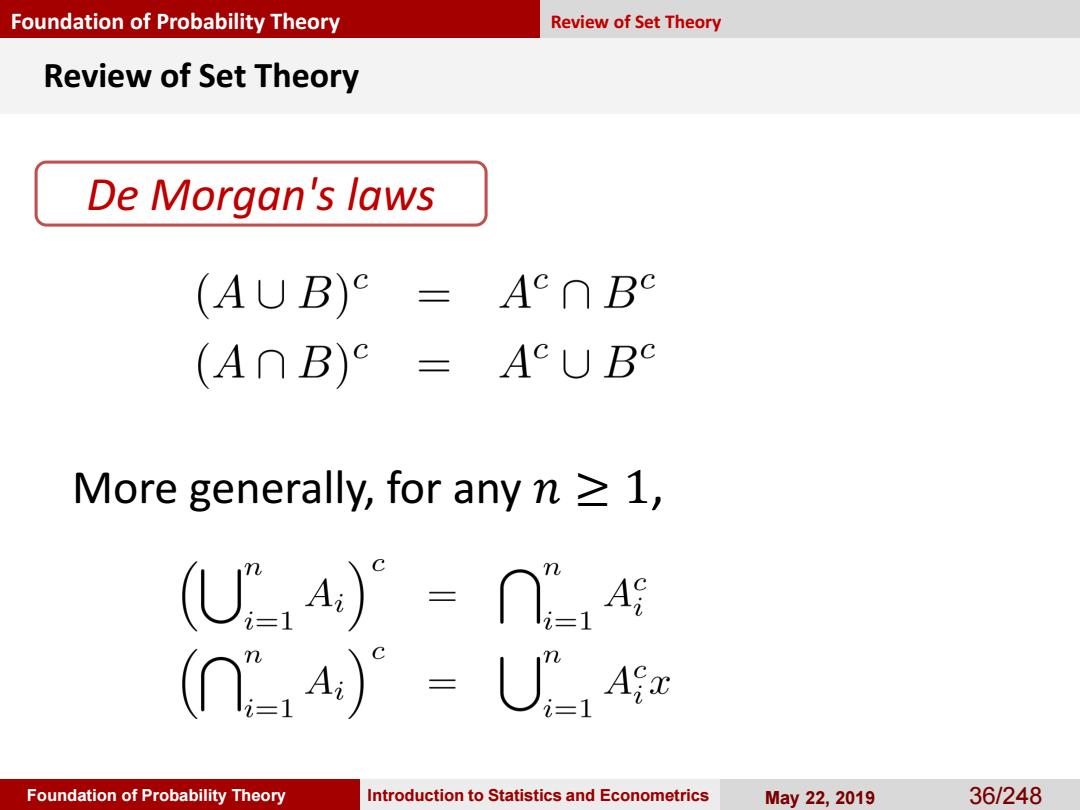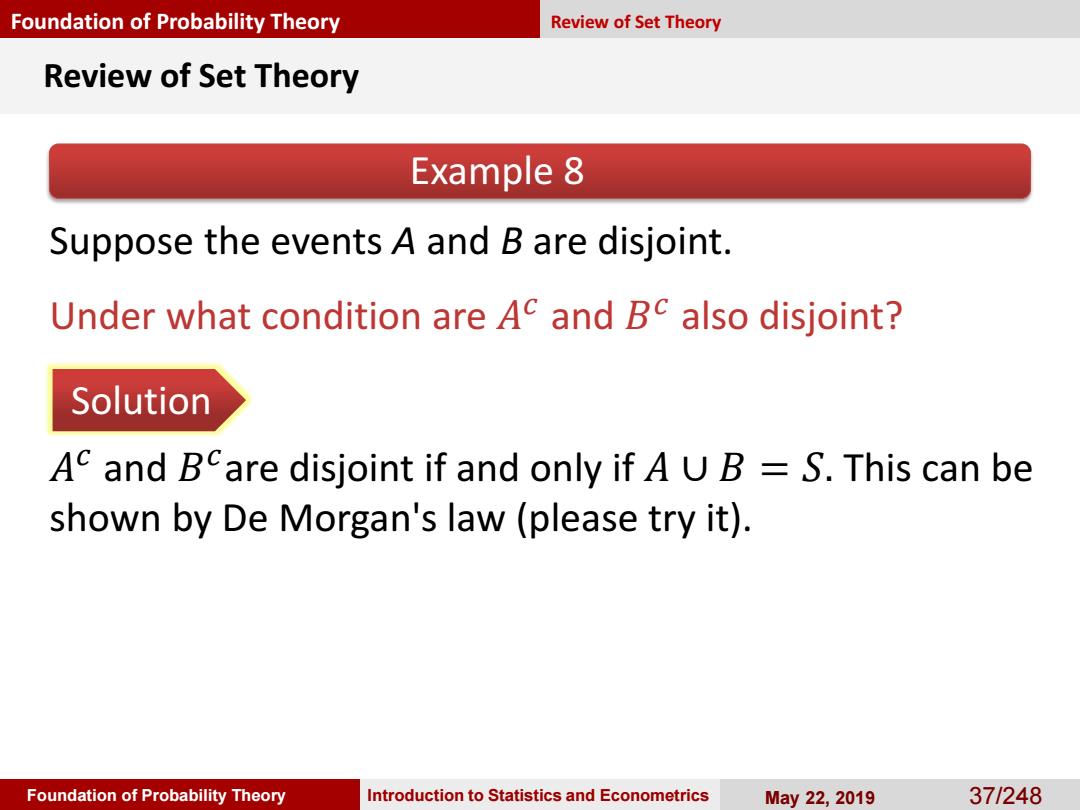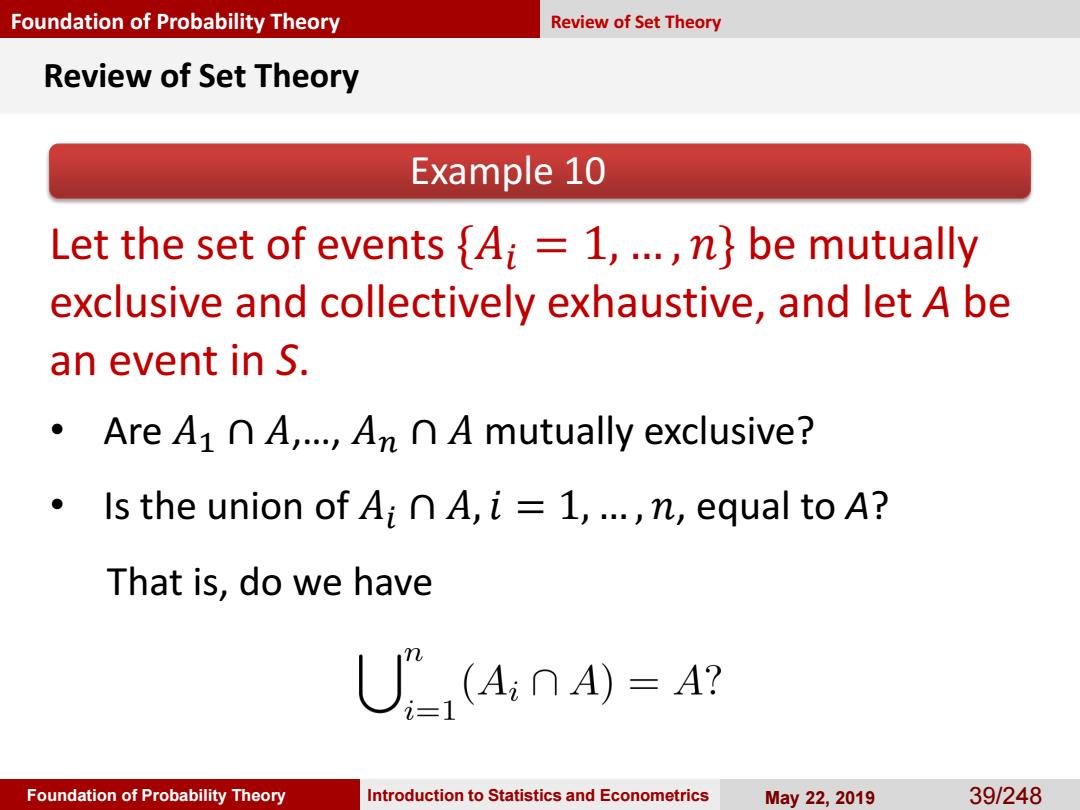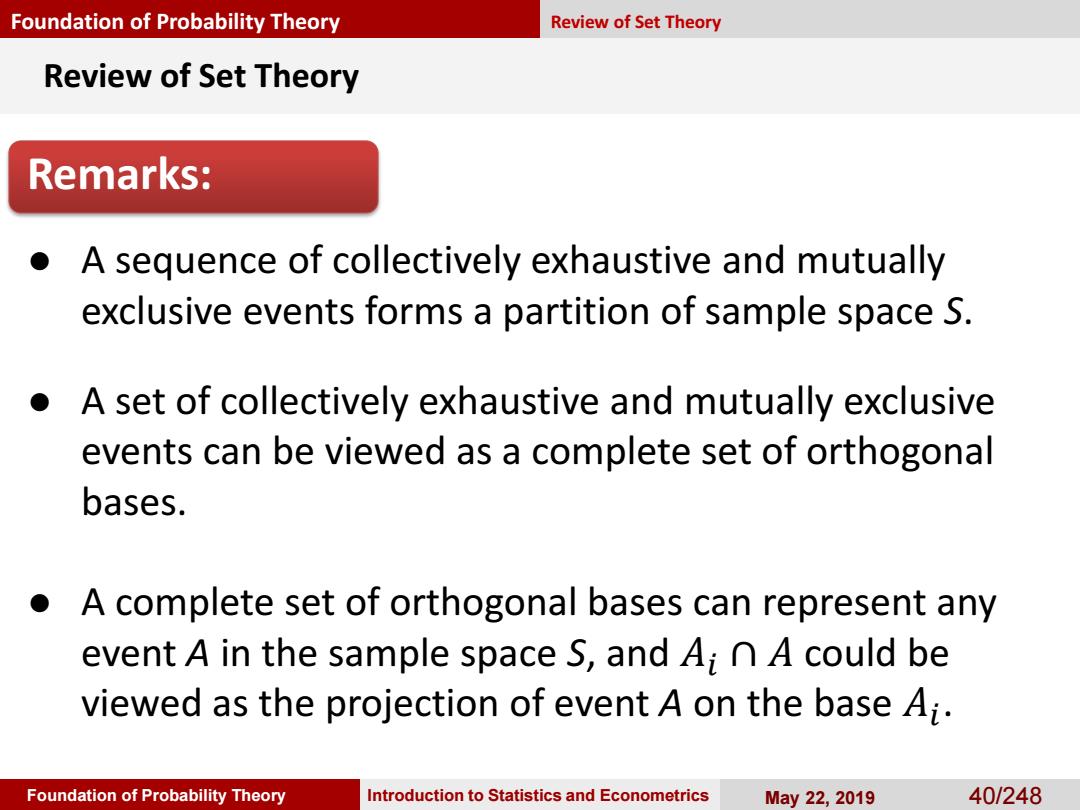
Foundation of Probability Theory Review of Set Theory Review of Set Theory De Morgan's laws (AUB) Ae∩B9 (A∩B)C=AcUB More generally,for any n >1, (U4)-∩4 (∩4)°=U,4x Foundation of Probability Theory Introduction to Statistics and Econometrics May22,2019 36/248
Foundation of Probability Theory Introduction to Statistics and Econometrics May 22, 2019 36/248 Review of Set Theory Foundation of Probability Theory Review of Set Theory De Morgan's laws More generally, for any 𝑛 ≥ 1

Foundation of Probability Theory Review of Set Theory Review of Set Theory Example 8 Suppose the events A and B are disjoint. Under what condition are Ac and Bc also disjoint? Solution Ac and BCare disjoint if and only if A UB =S.This can be shown by De Morgan's law(please try it). Foundation of Probability Theory Introduction to Statistics and Econometrics May22,2019 37/248
Foundation of Probability Theory Introduction to Statistics and Econometrics May 22, 2019 37/248 Review of Set Theory Foundation of Probability Theory Review of Set Theory Example 8 Suppose the events A and B are disjoint. Under what condition are 𝐴 𝑐 and 𝐵 𝑐 also disjoint? 𝐴 𝑐 and 𝐵 𝑐 are disjoint if and only if 𝐴 ∪ 𝐵 = 𝑆. This can be shown by De Morgan's law (please try it). Solution

Foundation of Probability Theory Review of Set Theory Review of Set Theory Example 9 Answer the following questions: AreA∩B and A∩B mutually exclusive? ·Is(A∩B)U(Ac∩B)=B? Are A and Ac n B mutually exclusive? ·IsAU(Ac∩B)=A∩B? Foundation of Probability Theory Introduction to Statistics and Econometrics May22,2019 38/248
Foundation of Probability Theory Introduction to Statistics and Econometrics May 22, 2019 38/248 Review of Set Theory Foundation of Probability Theory Review of Set Theory Example 9 Answer the following questions: • Are 𝐴 ∩ 𝐵 and 𝐴 𝑐 ∩ 𝐵 mutually exclusive? • Is 𝐴 ∩ 𝐵 ∪ 𝐴 𝑐 ∩ 𝐵 = 𝐵? • Are 𝐴 and 𝐴 𝑐 ∩ 𝐵 mutually exclusive? • Is 𝐴 ∪ 𝐴 𝑐 ∩ 𝐵 = 𝐴 ∩ 𝐵?

Foundation of Probability Theory Review of Set Theory Review of Set Theory Example 10 Let the set of events Ai=1,...n}be mutually exclusive and collectively exhaustive,and let A be an event in S. Are A1nA,...,An n A mutually exclusive? Is the union of AinA,i=1,...,n,equal to A? That is,do we have (A:0A)=4? Foundation of Probability Theory Introduction to Statistics and Econometrics May22,2019 39/248
Foundation of Probability Theory Introduction to Statistics and Econometrics May 22, 2019 39/248 Review of Set Theory Foundation of Probability Theory Review of Set Theory Example 10 Let the set of events {𝐴𝑖 = 1, … , 𝑛} be mutually exclusive and collectively exhaustive, and let A be an event in S. • Are 𝐴1 ∩ 𝐴,…, 𝐴𝑛 ∩ 𝐴 mutually exclusive? • Is the union of 𝐴𝑖 ∩ 𝐴, 𝑖 = 1, … , 𝑛, equal to A? That is, do we have

Foundation of Probability Theory Review of Set Theory Review of Set Theory Remarks: A sequence of collectively exhaustive and mutually exclusive events forms a partition of sample space S. A set of collectively exhaustive and mutually exclusive events can be viewed as a complete set of orthogonal bases. A complete set of orthogonal bases can represent any event A in the sample space S,and Ai n A could be viewed as the projection of event A on the base Ai. Foundation of Probability Theory Introduction to Statistics and Econometrics May22,2019 40/248
Foundation of Probability Theory Introduction to Statistics and Econometrics May 22, 2019 40/248 Review of Set Theory Foundation of Probability Theory Review of Set Theory Remarks: ● A sequence of collectively exhaustive and mutually exclusive events forms a partition of sample space S. ● A set of collectively exhaustive and mutually exclusive events can be viewed as a complete set of orthogonal bases. ● A complete set of orthogonal bases can represent any event A in the sample space S, and 𝐴𝑖 ∩ 𝐴 could be viewed as the projection of event A on the base 𝐴𝑖